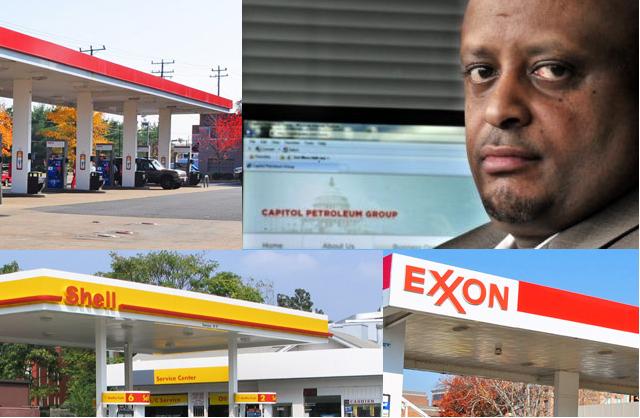Attempts to curb a Washington, D.C., gas station mogul raise issues of money, power -- and race.
In 1981 Mamo's father, Yenberber Mamo, who owned the Mamo Kacha bus company in Addis Ababa, sent Joe to a North Dakota boarding school to protect him from the communist regime that ruled Ethiopia. Now the commercial success of Joe Mamo, 44 -- founder, owner and CEO of privately held Capitol Petroleum Group, which controls 42 percent of Washington, D.C.'s gas stations -- is being questioned.
Mamo buys gas from oil refiners and sells it to the operators of the stations that he owns. A few of those operators say that Mamo has hiked their rent, the gas-delivery price and gas prices -- driving away potential consumers. District residents always complain that they pay more for gas than in the suburbs because of a mix of station location, taxes and other expenses. On Oct. 3, the street prices of a gallon of regular gas in the District and in adjacent Bethesda, Md., and Arlington, Va., neighborhoods were mostly comparable, with gas at $3.31 to 3.89 in Arlington and $3.05 to $4.29 in the District.
In response to the operators' complaints, D.C. City Council member Mary M. Cheh has sponsored antitrust legislation against Mamo's business "to break up what some members call a near monopoly of the local gasoline market."
Cheh says there will be increased competition in the District's retail gas market if fuel wholesalers, who would still be allowed to own retail stations, are prohibited from operating the stations or collecting the income associated with gasoline sales. But the Washington Post reported recently that the proposal has hit a solid wall.
The proposed law strikes at the heart of Mamo's business and bothers his supporters. Consequently, in a city where there is a dearth of sizable black-owned businesses, the attempts of Cheh, who is white, to persuade at least seven of the 12-member D.C. Council to support her potential law failed. The Post said that was "because of growing skepticism from mostly African-American council members concerned that the bill unfairly targets a successful black entrepreneur."
In an interview with The Root, Mamo said, "I broke through a racial barrier by becoming a fuel distributor for Texaco, Exxon and Shell, and there are fewer than 10 black distributors nationwide. The law that Cheh proposed also does not exist anywhere else in the United States, and we contend that it is unconstitutional."
The Capital Petroleum CEO also says that he doesn't set the District's gas prices and that owning gas stations is a stepping-stone business. "We are really a real estate company. Long term, the real estate is where the value [of a station] is," he told the City Paper, a local weekly.
The Beginning
A Washington City Paper article reported that Mamo first worked in a gas station while he was a community college student. His entrepreneurial impulse emerged in 1987, when, with his savings and father's help, he bought his first D.C. gas station. Over two decades, Capital Petroleum became one of the area's largest motor fuel distributors, transporting gas from the refiners to the station operators.
Along the way, Mamo bought, leased or built gas stations, in effect supplying fuel to the stations that he owns but that others manage. Then, in 2009, as oil companies sold off company-owned retail stations, he joined a host of other entrepreneurs who wanted to buy those stations. Between April 2009 and December 2010, Mamo worked with the advisory firm Petroleum Capital & Real Estate LLC and bought 211 Exxon and Shell stations. Most are in the District and northern Virginia, but 71 are in New York City.
Mamo's website says that 2010 revenues were projected to be $778 million. That figure places Capitol Petroleum in the top 10 of the nation's largest black-owned businesses.
Most of the deal's financing came from an unnamed private-equity real estate investment trust that learned of Mamo through his advisory company. In 2009 one of Mamo's companies bought 36 Exxon stations and then completed a sale-leaseback with Getty Realty Corp., the nation's leading publicly traded real estate investment trust, which specializes in ownership and leasing of convenience store gas stations and petroleum-distribution terminals.
Friends in Many Places
A key to Mamo's success is his mastery of two important business attributes: corporate networking and making nice with politicians. According to a newspaper article, early in his gas station career, Mamo hired a Mobil oil executive-turned-consultant. That relationship led in 1996 to Mamo becoming Texaco's first black distributor. Two years later he became one of the first black distributors for Exxon.
Since the mid-1990s, Mamo has also met many of the D.C. region's elected and would-be politicians. In turn he, his family and his companies, as recorded by the District office of Campaign Finance, made donationsto District candidates for City Council, mayoral and state and congressional office.
Recently, in light of the opposition to Cheh's proposed legislation, another of its City Council proponents, Phil Mendelson, urged a lobbyist working with disgruntled service station owners to find a compromise solution. Which raises the question: If Mamo makes his money in traditional -- and legal -- fashion, what's the problem?
http://www.theroot.com



No comments:
Post a Comment